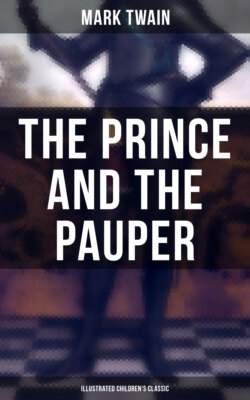Читать книгу The Prince and the Pauper (Illustrated Children's Classic) - Mark Twain - Страница 85
На сайте Литреса книга снята с продажи.
XVI. The Turning-Point
ОглавлениеTable of Contents
There came into his life just at this period one of those seemingly trifling incidents which, viewed in retrospect, assume pivotal proportions. He was on his way from the office to his home one afternoon when he saw flying along the pavement a square of paper, a leaf from a book. At an earlier time he would not have bothered with it at all, but any printed page had acquired a professional interest for him now. He caught the flying scrap and examined it. It was a leaf from some history of Joan of Arc. The "maid" was described in the cage at Rouen, in the fortress, and the two ruffian English soldiers had stolen her clothes. There was a brief description and a good deal of dialogue—her reproaches and their ribald replies.
He had never heard of the subject before. He had never read any history. When he wanted to know any fact he asked Henry, who read everything obtainable. Now, however, there arose within him a deep compassion for the gentle Maid of Orleans, a burning resentment toward her captors, a powerful and indestructible interest in her sad history. It was an interest that would grow steadily for more than half a lifetime and culminate at last in that crowning work, the Recollections, the loveliest story ever told of the martyred girl.
The incident meant even more than that: it meant the awakening of his interest in all history—the world's story in its many phases—a passion which became the largest feature of his intellectual life and remained with him until his very last day on earth. From the moment when that fluttering leaf was blown into his hands his career as one of the world's mentally elect was assured. It gave him his cue—the first word of a part in the human drama. It crystallized suddenly within him sympathy with the oppressed, rebellion against tyranny and treachery, scorn for the divine rights of kings. A few months before he died he wrote a paper on "The Turning-point of My Life." For some reason he did not mention this incident. Yet if there was a turning-point in his life, he reached it that bleak afternoon on the streets of Hannibal when a stray leaf from another life was blown into his hands.
He read hungrily now everything he could find relating to the French wars, and to Joan in particular. He acquired an appetite for history in general, the record of any nation or period; he seemed likely to become a student. Presently he began to feel the need of languages, French and German. There was no opportunity to acquire French, that he could discover, but there was a German shoemaker in Hannibal who agreed to teach his native tongue. Sam Clemens got a friend—very likely it was John Briggs—to form a class with him, and together they arranged for lessons. The shoemaker had little or no English. They had no German. It would seem, however, that their teacher had some sort of a "word-book," and when they assembled in his little cubby-hole of a retreat he began reading aloud from it this puzzling sentence:
"De hain eet flee whoop in de hayer."
"Dere!" he said, triumphantly; "you know dose vord?"
The students looked at each other helplessly.
The teacher repeated the sentence, and again they were helpless when he asked if they recognized it.
Then in despair he showed them the book. It was an English primer, and the sentence was:
"The hen, it flies up in the air."
They explained to him gently that it was German they wished to learn, not English—not under the circumstances. Later, Sam made an attempt at Latin, and got a book for that purpose, but gave it up, saying:
"No, that language is not for me. I'll do well enough to learn English." A boy who took it up with him became a Latin scholar.
His prejudice against oppression he put into practice. Boys who were being imposed upon found in him a ready protector. Sometimes, watching a game of marbles or tops, he would remark in his slow, impressive way:
"You mustn't cheat that boy." And the cheating stopped. When it didn't, there was a combat, with consequences.
